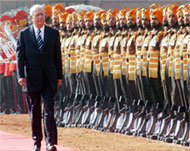Lady president likely for Chile
Instead of macho handshakes on the campaign trail, the leading candidates in Chile’s presidential race are exchanging kisses on the cheek this election year.

In this socially conservative country where domestic violence is common and women earn much less than men, the two top parties have selected female nominees, virtually ensuring that Chile will get its first female head of state.
Opinion polls show the two women, Michelle Bachelet and Soledad Alvear, commanding huge leads over all other rivals for the 12 December elections to replace President Ricardo Lagos.
“There are still some macho attitudes in our country, but all opinion polls show that a major cultural change has occurred in that respect,” Alvear said.
“The time has come for a woman president.”
Changing attitudes
Their early emergence indicates an important shift in attitudes in this South American country, where growing public disgruntlement with politics as usual is creating new political opportunities for women.
 |
|
Chile will elect President Lagos’s |
“Women are seen as more honest, more concerned about the poor and more democratic,” said Maria de los Angeles Fernandez, a political scientist at Diego Portales University.
Many Chilean women are hoping the candidacies could prove a significant step in bolstering women’s issues in this predominantly Roman Catholic country of 11 million. Legislators have passed laws in recent months to bolster women’s rights, and on Friday a law outlawing sexual harassment in the workplace took effect.
“It’s proof that Chile is making great strides,” said Maria Isabel Figueroa, the manager of a Santiago hotel.
Unfinished agenda
Still, many point out that much work remains. Government statistics show Chilean women still earn significantly less than men and are frequently discriminated against at work.
|
“This does not mean that discrimination against women has ended,” Congresswoman Maria Antonieta Saa said in an interview about the two female candidates. “It still exists in the workplace and domestic violence is still prevalent.”
But she said the possibility of female president “is a positive step. Society is removing the taboo that women can’t govern. It’s a strong signal for the entire country.”
Surprisingly, the issue has proved secondary on the campaign trail, said Marta Lagos, a sociologist with the Latinobarometro think-tank.
She said recent opinion surveys indicated voters see Bachelet and Alvear “as candidates who are just human beings, not as candidates who wear skirts and high heels.”
Earlier examples
Women have held the presidency in several Latin American countries, including Argentina, Bolivia, Nicaragua and Panama.
Bachelet, 52, is a member of the Socialist Party, like Lagos and Salvador Allende, the president toppled in the 1973 coup led by Gen. Augusto Pinochet.
|
She is the daughter of an Air Force general who was arrested and tortured for opposing Pinochet’s military regime. She and her mother were also briefly jailed before being forced into exile during the 17-year dictatorship.
She developed a close relationship with the nation’s top commanders after Lagos, in a surprise move, appointed her defence minister two years ago. She resigned in December to seek the presidential nomination.
Alvear, 54, is a lawyer with an extensive public-service background. As the country’s first head of women’s affairs she built a ministry, as justice minister she implemented the modernisation of Chile’s justice system, and as foreign minister she successfully negotiated free-trade accords with the United States, the European Union, South Korea, Canada and Mexico. She is a member of the Christian Democratic Party.
Neither candidate has unveiled her platform, but both have touched on at least some women’s issues. On campaign stops around the country, both talk of improving the availability of day care to working mothers.
Both candidates say they would pay special attention to the poor.
“Our main challenge is increasing our economic growth, but with greater social justice and equality,” Alvear said.
The prospect of a female president has injected some unexpected enthusiasm into an otherwise dull election season, mainly among women.
Ximena, a waitress in a thong bikini in one of Santiago’s famous “cafes with legs” who wouldn’t give her last name, said she was considering registering to vote for the first time in her life.
“One of us will be in command for the first time,” she said.